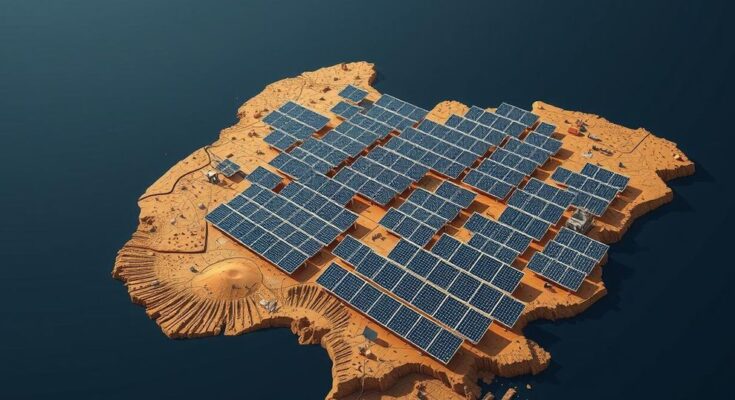Egypt has launched a solar power initiative in Djibouti to reduce the latter’s reliance on Ethiopia and enhance bilateral relations. The project will establish a solar farm, with Egypt funding it and training local technicians. This collaboration reflects a broader strategy amidst regional tensions involving Ethiopia, which historically has strong trade ties with Djibouti.
Egypt has enhanced its diplomatic engagement with Djibouti by initiating a significant solar energy project aimed at diversifying Djibouti’s energy sources and minimizing its dependence on Ethiopia, Egypt’s regional adversary. This ambitious endeavor seeks to establish a solar power farm in Djibouti’s desert landscape, with future expansion possibilities up to 300 kilowatts. The Egyptian government will not only finance this project but also provide training for Djiboutian technicians responsible for its operation, as reported on a Tuesday update. The agreement was formally signed via a virtual meeting between Egypt’s Minister of Energy, Mahmoud Essmat, and his Djiboutian counterpart, Yonis Ali Gued. The focus of their discussions primarily revolved around economic aspirations, consciously sidestepping the political ramifications within the broader regional context. The specifics of the deal include the provision and installation of solar panels in the vicinity of Omar Jaggaa. Alexis Mohamed, an adviser to President Ismail Omar Guelleh, stated, “The signing on Tuesday of an agreement on the construction of a solar power plant… not only marks a step towards a mutually beneficial collaboration between our two countries, but also reaffirms the demands of President Ismail Omar Guelleh, who continues to make the energy issue a national priority in favour of our economic and social development.” While the discussions were framed as bilateral, the implications for regional dynamics, particularly in relation to Ethiopia, are notable. Ethiopia and Djibouti share robust trade links, as Ethiopia relies heavily on the Port of Djibouti for nearly 95 percent of its imports, while Djibouti sources over 60 percent of its electricity from Ethiopia. Recent tensions have arisen between Somalia and Ethiopia over a contentious memorandum of understanding concerning sea access, with Djibouti extending an invitation to Ethiopia to develop a new port on its land—an offer that Ethiopia has yet to accept as it seeks alternatives for naval access. At the same time, a new transmission line funded by the African Development Bank (AfDB) connects Djibouti to a power supply from Ethiopia, further complicating the energy landscape. Djibouti has witnessed a notable increase in electricity demand linked to heightened commercial activity at its port, forecasting consumption to surge to approximately 1 GWh daily by 2030. This awareness fosters an inclination towards renewable energy investments, particularly in solar and geothermal sectors. With the present rate indicating that 65 percent of Djibouti’s populace has access to electricity, projections suggest this figure could rise to 72 percent once the new energy infrastructure is operational, and even higher with the integration of the upcoming solar farm.
The geopolitical context surrounding Egypt, Ethiopia, and Djibouti is marked by historical rivalry, particularly over Nile water rights and regional influence. Ethiopia’s construction of the Grand Ethiopian Renaissance Dam has heightened concerns in Egypt regarding water scarcity. Djibouti has positioned itself as a strategic hub in the Horn of Africa, relying on its port and energy ties with Ethiopia. The current solar project reflects Egypt’s strategic pivot to strengthen alliances with nations historically aligned with Ethiopia, in a bid to expand its influence and energy security within the region.
In conclusion, Egypt’s new solar power project in Djibouti underscores a strategic maneuver to fortify energy collaboration and reduce Djibouti’s reliance on Ethiopia amidst ongoing regional tensions. The project not only symbolizes a step forward in bilateral cooperation but also aligns with Djibouti’s aspirations for diversification in energy sources and economic growth. This development carries significant implications for the geopolitical landscape of the Horn of Africa, where energy security and diplomatic relations are intricately linked.
Original Source: www.theeastafrican.co.ke




